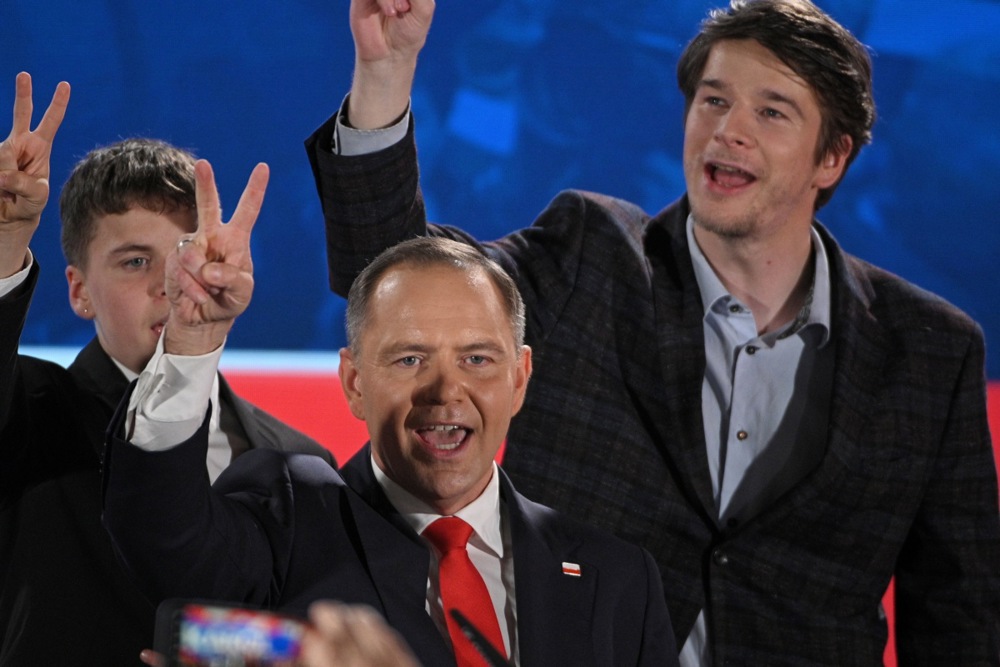Polish prime minister Donald Tusk on June 11 won a confidence vote in parliament arguing that his party’s candidate narrow loss in the presidential election of June 1 renewed the mandate of his government granted in the 2023 parliamentary elections as the number of votes polled was similar in both elections.
He argued that the voters had back in 2023 given his government a full term in office, that his government’s vote in the presidential election had held up and that a presidential election does not in any way affect that mandate.
“We have a mandate to take full responsibility for what’s happening in Poland,” Tusk told MPs, arguing that “over 10 million votes in the presidential election for our candidate confirms our mandate”.
The Tusk centre left-government’s candidate Rafał Trzaskowski lost the presidential election with 49 per cent of the vote, polling just over 10 million votes in the process.
During the election campaign, his victorious opponent Karol Nawrock (51 per cent), who was backed by the opposition Conservatives (PiS), had framed that ballot as one of no confidence in the Tusk administration.
Critics argued the government has made limited progress on campaign promises, including liberalising abortion law, reforming the judiciary, improving access to affordable housing and raising the tax-free income threshold.
The ruling coalition claimed those initiatives were delayed amid hopes that a Trzaskowski win would provide a co-operative president but instead Nawrocki’s victory would, as Tusk admitted, make it much tougher to rule.
While the coalition’s parliamentary majority gave the PM certainty that he would win the June 11 confidence vote, a recent poll found that about a third of Poles believe his government would not serve out its full term through 2027, Reuters reported.
Although Poland’s president does not govern directly, the office holds significant veto power over legislative matters and some State appointments.
In his post-vote speech, Tusk promised that the government would communicate more effectively with the public. He also said it would not back off from its attempts to reform the judiciary and to pursue officials from the former PiS administration for alleged crimes.
“Perhaps we overestimated the belief that truth would defend itself,” he said, adding: “We should have boasted about our achievements.”
Tusk had a defiant message for those expecting the government to wilt or for him to resign.
“In my time I have known the taste of victory and the bitterness of defeat but I do not know the term ‘capitulation’”.
Left-wing MP and government critic Adrian Zandberg responded, saying: “Tusk said he does not know such a word as ‘capitulation’, maybe he should familiarise himself with the word ‘retirement’”.
He was probably alluding to the fact that the PM is 68 years old and that he has been in Polish politics since 1989 and Prime Minister for more than eight years.
He was also scathing about Tusk’s emphasis on the need for better communication and his assertion that he had retained his mandate.
“Everything is super, we just haven’t done enough to communicate it. We lost, but we won,” Zandberg sniped.
Some politicians from the ruling coalition have gone on record to suggest Tusk should resign as PM.
Many favour his replacement being either the defence minister and leader of the Polish People’s Party (PSL) Władysław Kosiniak-Kamysz or the foreign minister Radosław Sikorski from Tusk’s own Civic Coalition KO).
The strongest criticism came from the deputy speaker of the Senate, the Polish parliament’s second chamber, Michał Kamiński.
“Tusk has already offended Trump by calling him a Russian asset and he has also offended the president elect Nawrocki by claiming that he was a pimp, I do not want such a Prime Minister,” he said.
But when the vote in Parliament came all the government supporting parties’ deputies voted to renew Tusk’s mandate and all the opposition MPs voted against.





